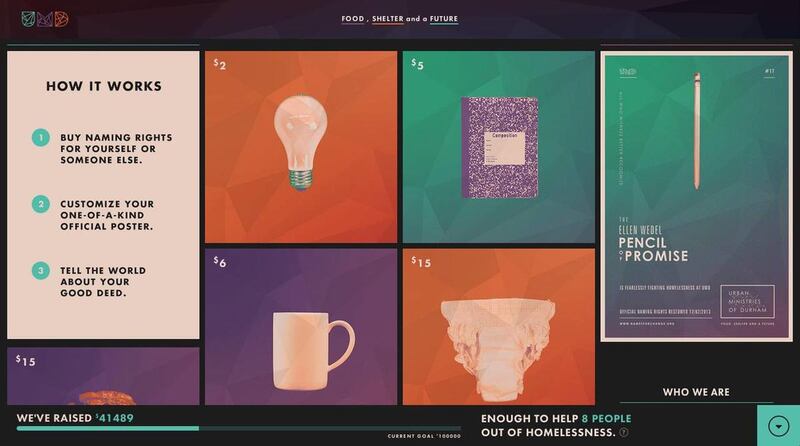Jenny Nicholson realized she had forgotten deodorant hours too late. In the rush of her morning, booked with final preparations for a 3 p.m. presentation in front of civic officials, her advertising agency and the staff of United Ministries of Durham, it slipped her mind.
"You don’t think deodorant is something that matters until you don’t have it," said Nicholson, associate creative director at McKinney, an advertising agency based in Durham, N.C. "And then you have to walk around like a confident professional while worrying whether or not you smell."
But as luck would have it, the forgotten deodorant reinforced the importance of Nicholson's presentation for a new campaign that carries a blunt reminder: It's all just stuff — until you don't have it.
More than three weeks ago, Nicholson and her team at McKinney, in partnership with North Carolina's Urban Ministries of Durham, launched a campaign seeking to reduce homelessness one household item at a time.
Names for Change is innovating fundraising for homelessness within its community by offering the naming rights to donors for simple household items like toothbrushes, light bulbs, aprons and pencils.
And it all started with a game.
When empathy goes viral
In 2011, Nicholson was part of a team that launched SPENT, another campaign for Urban Ministries of Durham, one of the largest homeless shelters in North Carolina that is innovating new ways to combat poverty. SPENT is an online game that challenges the player to experience life on the edge of homelessness.
Each player faces the harsh reality of surviving on his or her last $1,000 and a month of decisions to make to try to avoid homelessness.
"One thing I noticed was that when you finished the game, you would feel really depressed and hopeless," Nicholson said.
But ultimately, she said, that was the point. SPENT is designed to teach the player how difficult it is to be teetering on the edge of hopelessness and create empathy for people living in poverty or homelessness.
According to the 2013 Annual Homeless Assessment Report to Congress, conducted by the U.S. Department of Housing and Urban Development, more than 610,000 people were homeless on a given night in January. Sixty-five percent were living in emergency shelters or transitional housing programs, the study found, and 35 percent lived in unsheltered locations.
Since its launch nearly three years ago, SPENT has been played more than 4.4 million times in 216 countries and has 5,000 new players a day, according to Janet Northen, director of agency communications for McKinney.
Because of SPENT, the North Carolina shelter has raised more than $70,000.
And yet, it had only hit the tip of the iceberg.
A bite of the elephant
Urban Ministries of Durham's executive director Patrice Nelson estimates that it takes an average of $5,000 to get someone off the streets and into a home of their own.
Last year, Urban Ministries of Durham moved 245 people from the shelter to permanent housing. To find the cost per person, Nelson said they divide the total from their annual expense audit by the number of people they place into permanent housing.
Judging by her measurements, which are similar to methods used nationally, the money raised from SPENT since it began in 2011 would end homelessness for 14 people.
This year's Annual Homelessness Assessment Report estimated there were 12,168 homeless adults in North Carolina. The state had between 1 to 2.9 percent of the nation's total homeless population.
"We realized that one of the problems that you have being a homelessness nonprofit is that the problem feels so big that it's really easy not to do anything, because it feels like what you do isn't going to make a difference," Nicholson said.
While brainstorming for innovative ways to raise money, Nicholson heard that a major brand was about to pay $220 million for the naming rights to a stadium.
The rest is history. Or rather, hoping to make history.
The lightbulb of bright futures
The idea of naming rights got Nicholson thinking.
If a brand was willing to pay millions for its name on the side of a stadium, and college alumni pay for their names on the bricks that pave their alma mater, what would happen if a homeless shelter offered naming rights to cans of corn or bottles of shampoo?
"We wanted to find some way to capture what a difference even the smallest things can make for someone who is living in a shelter on the edge of homelessness," Nicholson said.
Through its Names for Change website, Urban Ministries of Durham decided to sell the naming rights to everything in its building — from walk-in freezers to toiletries. The site, designed by advertising firm McKinney, uses bold colors and sleek graphics to invite donors to choose from an apron to an oven, and from underwear to an interview outfit.
Once a shopper buys the “naming rights” to an item like a can of vegetables, she can create an online certificate in her own name, someone else’s name, or for an institution, and customize the certificate with a name such as “Corn of Compassion,” or “Peas of Mind.” Some items that need constant replenishment, like rice and toothbrushes, are "bottomless" and can be renamed any number of times and donated on a recurring monthly basis. Other items, like a freezer or a front porch, can only be named once.
Once a donor has completed her donation and created her certificate for “The Socks of Warmth and Happiness,” she can share it via social media, email it, print it, or even have it shipped as a gift.
The colorful website and promise of customization turns the relatively dull task of donating canned food and goods into a whimsical experience, where anyone can be the proud owner of a “Fork of Mass Nutrition,” “Baby Bottle of Benevolence,” or “Deodorant of Clean Starts.”
Though the actual item isn't donated to the shelter — that would be a lot of teddy bears, Nicholson said — the money that is donated is used to keep the shelter running. The naming rights give donors a fun, innovative and interactive way of giving back.
Each month, Urban Ministries of Durham serves 18,000 meals, and lately upwards of 700 meals a day. It supplies clothing to 425 households per month and provided shelter to 140 people per night in the last year. These numbers show an increase in its services in each area over the past year.
By naming items like the "Pencil of Promise" or the "Pacifier of Calm," it's Nicholson's hope that donors will understand that for a person in need, nothing is inconsequential.
"The idea is that a toothbrush, or a box of macaroni and cheese may not seem like a big deal, but for people who don't have anything, those things are huge," Nicholson said.
It's about more than just raising awareness, she said.
Because organizations like Urban Ministries of Durham are seeing funding cuts every year alongside skyrocketing demand, money is essential. And for Nicholson, it makes the positive response to her campaign all the more gratifying.
In just over a month of campaigning, Names for Change has raised more than $36,000 from visitors in more than 150 countries.
Hitting close to home
For Nicholson, the goal of helping those who have fallen on hard times holds deep roots.
While she was never homeless, as a child Nicholson and her family visited the food pantry often. Her sister has continued to struggle with poverty for most of her adult life.
During a particularly rough time for Nicholson's sister, she was making her three children dinner with the only food they had left in the house — a box of grits.
While making it, she dropped the last of their food all over the floor. She sat down next to the spilled food and cried.
"She couldn't not feed it to them," Nicholson said. "But then she was going to have to feed her kids food that she had scraped up off the floor. It was such a powerful example of the fact that something doesn't seem special or important or crucial can be the difference for someone."
Which comes full circle for Names for Change's goal.
"I hope (donors) think a little differently about things," said Nicholson, who is trying to change the perception of homelessness.
Hand sanitizer becomes health insurance, and a can of beans becomes the sole source of protein. And for Nicholson, this altered perception is changing lives.
Because the future can be found in anything from a can of beans, a bus pass or even a stick of deodorant.
Email: ebuchanan@deseretnews.com, Twitter: emmiliewhitlock



